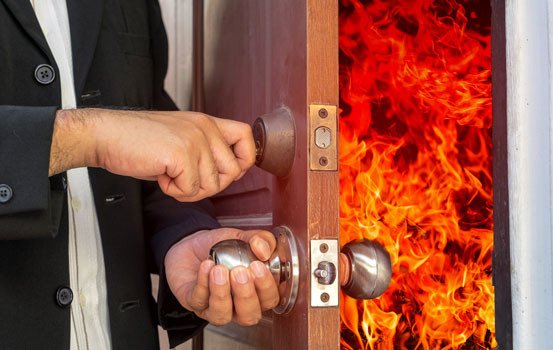Evaluating Fire Door Suppliers: A Comprehensive Guide
Selecting a reliable fire door supplier is crucial for ensuring building safety and code compliance. Fire doors are a critical element of a building’s fire protection system, and the quality of these doors is paramount. To assist you in evaluating and choosing the right fire door supplier, follow this comprehensive guide:
1. Define Your Project Requirements
Before evaluating fire door suppliers, establish a clear understanding of your project’s specific requirements, including:
- Fire Resistance Rating: Determine the required fire resistance rating for the doors based on your building’s occupancy, use, and local fire codes.
- Door Types and Locations: Identify where fire doors are needed in your building and determine the type of doors (e.g., swinging doors, sliding doors, rolling steel doors) based on your layout and safety requirements.
- Materials and Aesthetics: Consider the material and facing options that align with your project’s aesthetic and functional needs. Common materials include steel, wood, glass, or a combination.
- Quantity and Sizes: Determine the quantity and sizes of fire doors required for your project.
2. Research Fire Door Suppliers
Start your search for fire door suppliers by conducting thorough research:
- Online Search: Use the internet to search for suppliers and visit their websites to learn about their products, services, certifications, and experience.
- Recommendations: Seek recommendations from architects, contractors, or industry professionals who have experience with fire door suppliers.
- Certifications: Verify if the supplier’s products have certifications from recognized testing organizations like Underwriters Laboratories (UL) or FM Global.
3. Evaluate Supplier Qualifications
After creating a list of potential suppliers, assess their qualifications and reputation:
- Experience: Look for suppliers with a proven track record in the industry, as experience often reflects a commitment to quality and safety.
- Certifications: Ensure the supplier’s products meet industry standards and regulations. Look for certification labels on their fire doors from recognized testing organizations.
- Testing Facilities: Inquire if the supplier has in-house testing facilities. Suppliers with their own testing capabilities often have better control over product quality.
- References and Case Studies: Request references and case studies from the supplier to gauge their ability to meet specific project requirements.
4. Review Product Range
Examine the supplier’s product range and assess whether they offer a variety of options that meet your project’s needs:
- Core Materials: Consider the core materials used in their fire doors, such as mineral wool, vermiculite, or other fire-resistant materials.
- Facing Materials: Evaluate the facing materials, which can include steel, wood, glass, or other materials.
- Customization: Ensure the supplier can customize fire doors to meet your project’s specific requirements.
5. Consult with the Supplier
Contact the supplier directly to discuss your project and gain a better understanding of their capabilities:
- Consultation: Collaborate with the supplier to evaluate your project’s requirements and design a fire door plan that aligns with local building codes and safety standards.
- Site Visit: If possible, arrange for a site visit to the supplier’s manufacturing facility to observe their processes and quality control measures.
- Service and Support: Inquire about their after-sales support, including maintenance, warranties, and replacement parts.
6. Obtain Quotes and Proposals
Request detailed quotes or proposals from the suppliers you’re considering. Compare pricing, lead times, and any additional services offered. Ensure that the quote encompasses all your project requirements.
7. Consider Reputation and References
Check the supplier’s reputation within the industry and look for references from previous clients. Contact these references to learn about their experiences with the supplier.
8. Make Your Decision
Based on your research, evaluations, consultations, and budget considerations, make an informed decision on which fire door supplier is the best fit for your project. Choose a supplier with a solid track record, the right certifications, and a commitment to safety and quality.
Selecting the right fire door supplier is crucial for ensuring the safety and security of your building. By following this comprehensive guide and conducting thorough research, you can make an informed decision that aligns with your project’s specific needs and objectives.






